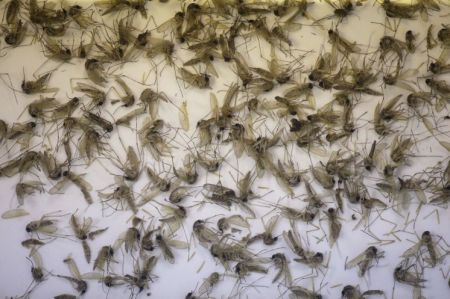UPDATED 7/29 | The Florida Department of Health and federal health officials confirm that four Zika cases in Miami-Dade and Broward counties are the first in the continental United States spread by local mosquitoes.
"At this time, the department believes that active transmission of the Zika virus are occurring in one small area in Miami-Dade County, just north of downtown," health officials said Friday. "This area is about 1 square mile ... While no mosquitoes trapped tested positive for the Zika virus, the department believes these cases were likely transmitted through infected mosquitoes in this area."
 » Related: “Sooner or later, our mosquitoes will pick it up. The threat is greater than I’ve seen in my lifetime.”
» Related: “Sooner or later, our mosquitoes will pick it up. The threat is greater than I’ve seen in my lifetime.”
The patients involved are three men and a women. As of Friday Florida has 386 Zika cases, including 99 in Miami-Dade and 55 in Broward. Until last week, all cases were classified as travel-related. Earlier, Tom Skinner, a spokesman for the federal Centers for Disease Control and Prevention, told Reuters that “evidence is mounting to suggest local transmission via mosquitoes is going on in South Florida.”
The health department updates Zika information daily at 2 p.m.
"These cases fit similar transmission patterns for mosquito-borne diseases such as Chikungunya that we've seen in South Florida in years past," Skinner said.
Florida’s Zika patients include 55 pregnant women who are considered at highest risk because of potential birth defects associated with Zika. Researchers say a prenatal Zika infection can cause microcephaly and other brain disorders.
The CDC has confirmed more than 1,650 Zika cases in the United States. New York leads the nation with 449 cases, followed by Florida. Puerto Rico has more than 4,600 cases of locally transmitted Zika, the CDC said.
Also, the U.S. Food and Drug Administration ordered blood centers in Miami-Dade and Broward to stop collections until all donations can be tested for the virus. Only one in five infected people, however, show symptoms, including joint pain, fever, rash and red eyes that can last more than a week.
According to state health officials, "The department is actively conducting door-to-door outreach and urine sample collection in the impacted area and will share more details as they become available."
The CDC, which was slow to acknowledge a sexual link with Zika, also said evidence emerged recently that the virus is spreading in unknown ways to scientists. A family member of a Utah man, who acquired Zika in a high-risk country, also was mysteriously infected.
In Florida, "they probably are testing mosquitoes from places where these [patients] work, play and live,” Dr. Aileen Marty, director of Health Travel Medicine at Florida International University, told told the South Florida Sun Sentinel.
Outside
Bitcoin mining emissions in China will hit 130 million tonnes by 2024 https://t.co/w6He7so8N2 pic.twitter.com/qYUDtBdeRK
— New Scientist (@newscientist) April 9, 2021
The Gunk Report
For the Blue-Green Algal Bloom Weekly Update from the Florida Department of Environmental Protection, tap here. For DEP's Algal Bloom Sampling Map, tap here.
What, me worry?
» "PLAYING WITH SHARKS," which recently premiered at the Sundance Film Festival, documents diving legend Valerie Taylor.